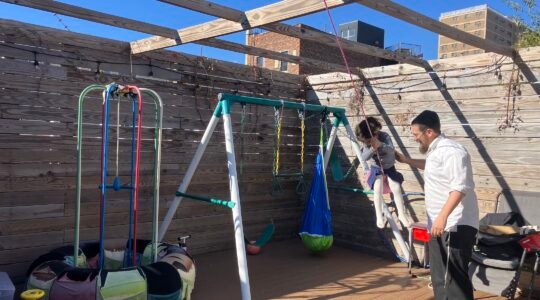The author, bottom left, with friends who are respectful of her Judaism and chemistry grades. Courtesy Lizzie Zakaim.
Being absent from school certainly has its drawbacks. After taking off for the first two days of Sukkot, I returned to Paramus High School bright and early on a Monday morning for period one chemistry. We were assigned partners to complete a lab that I had not been in school to begin. My lab partners were more than willing to get me up to speed on what I missed. One of them asked why I was absent.
A small part of me immediately tensed at this harmless question. In my four years of public school, no matter how many times I have been asked a question that requires an explanation involving Judaism, I immediately recoil. It is an irrational fear that I will somehow be ostracized for my faith. My lab partners are good-natured girls, though, and they seem curious, so I venture a short, but concise, explanation.
I explained Sukkot. How the Israelites constructed huts as shelters in the desert. How Jews eat, and sometimes sleep, in these huts as a demonstration of our faith in God. The hut is not a well-constructed shelter, though we have faith that God will shelter us from any danger, just as our ancestors believed in the desert.
“So you believe that God kept them safe then, and will keep you safe now?” asked one of the girls.
It occurred to me that these girls might be atheists or just doubting my belief in divinity. I mistook her tone as skeptical, not thinking that they were religious Christians. Their faith was revealed to me when this girl asked if by God I meant Jesus. She was not being skeptical, she was seeking confirmation.
I smiled and shook my head slowly.
“But you believe Jesus is God?” the other lab partner asked, confused at the incongruity in my statement. She looked to our fellow lab partner as if seeking confirmation of the question’s validity. Her friend raised her eyebrows, perhaps a little better informed. She muttered an, “I don’t think so,” and then turned those raised eyebrows to me.
I was completely unjustified in my emotional reaction. It made no sense for me to feel indignant. These girls were raised to believe that Jesus is God, just as I was raised to believe that Hashem is God. No one likes to have her beliefs countered, but I responded with, “We believe he existed. He is indeed a person, but we do not believe he is God.”
The lab partner with the raised eyebrows responded after a beat. “Who knows what to believe?” she sighed.
My anger evaporated. I felt instantly relieved that the conversation was over. There is clearly a quota concerning religious discussion in period one chemistry, and I think we surpassed it. We returned to our lab. Perhaps it was my irrationality, but I felt a dense, thick and completely invisible wall between my two lab partners and me.
My indignant reaction, and later regret, occurred because I realized that I wanted to be accepted by these girls. I feared that my faith would stand as a barrier to our potential friendship, and the conversation, in a sense, confirmed my worst fears.
But to my relief, there was no need to fear being singled out or made uncomfortable because of my religion. My lab partners did not ostracize me or ignore me. In fact, we worked well together and did well on that lab.
There have been times when I have been ridiculed for my faith by my peers, and there have been times when I’m admired by curious friends and teachers for my Jewish values and traditions. Neither situation has extinguished my flame of faith.
The New York Jewish Week brings you the stories behind the headlines, keeping you connected to Jewish life in New York. Help sustain the reporting you trust by donating today.




